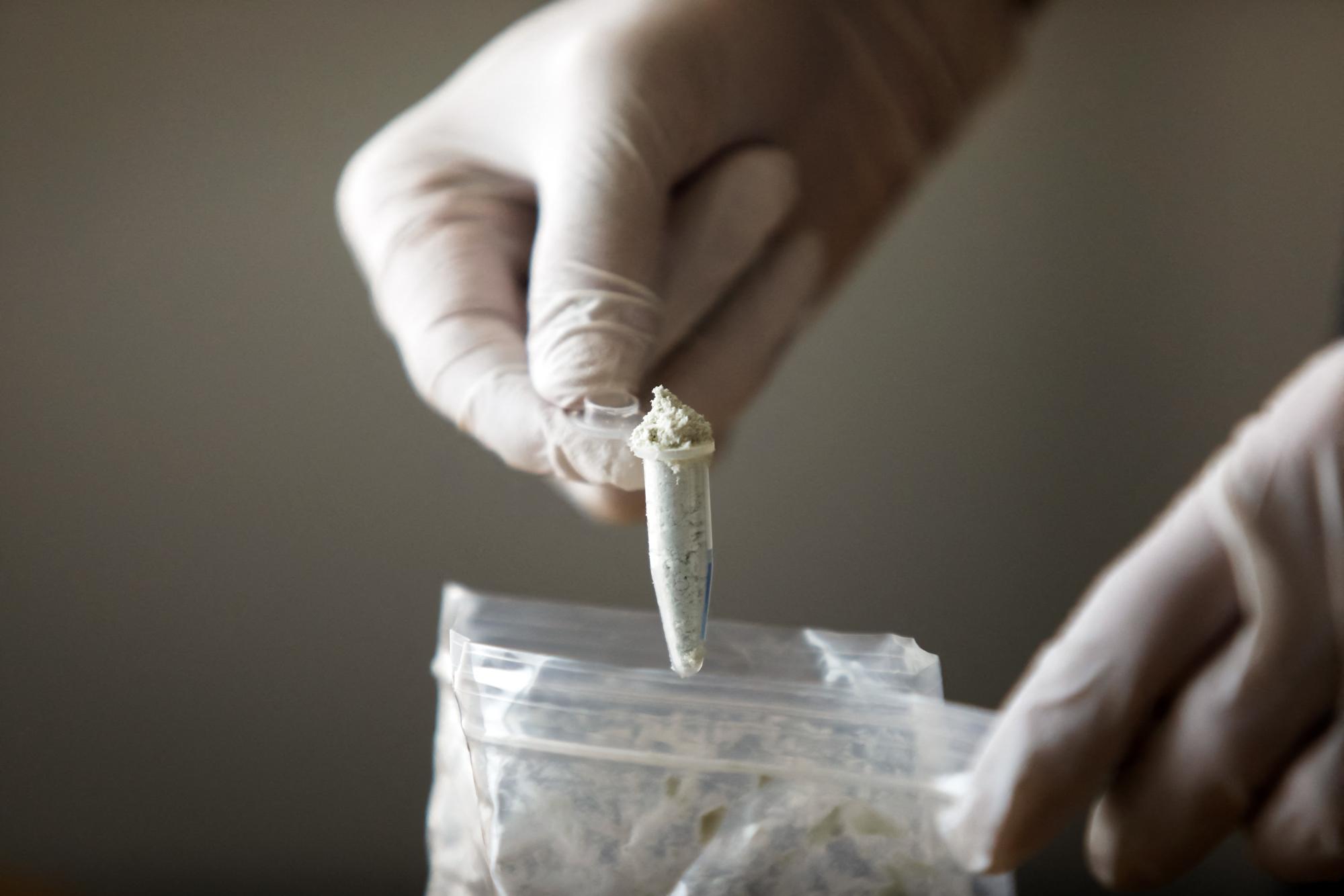Sandra Martinez of Riverside, California, had been searching for her missing daughter for months when she received the call that all parents dread—the one informing them that they have outlived their child.
Martinez had filed numerous missing persons reports, desperate to know what had happened to Qarinna. She knew her daughter had been struggling with drug addiction but was still hoping for the best.
The truth was more horrible than she could have imagined.
“My daughter was human-trafficked,” Martinez told The Epoch Times. “She was drug muled. She was robbed right before she was killed.”
Martinez learned from a witness that someone had given her daughter a dose of fentanyl and methamphetamines before leaving her on a set of train tracks.
Too intoxicated to find her way to safety, her daughter was struck and killed by a train a half hour later.
Officials were unable to identify the body and it was three months before Martinez received word. By that point, it was too late to get one last look at her daughter.
“She was too far in decomposing,” she said. “They said I probably would have died if I would have seen her.”
Martinez’s family is one of thousands to have been torn apart in recent years by the rapid proliferation of illicit fentanyl and other synthetic opioids.
President Donald Trump has pointed to the crisis as a reason to impose tariffs on Canada, China, and Mexico for allowing such drugs and their precursor chemicals to be trafficked across the United States’ northern and southern borders.
On Feb. 1, Trump signed executive orders imposing 25 percent tariffs on imports from Canada and Mexico and a 10 percent tariff on goods from China.
The tariffs on China took effect on Feb. 4. The other two countries’ tariffs have been delayed 30 days.
Critics say tariffs will do more harm than good—that they will increase costs for consumers and undermine relations with three of the United States’ top trade partners. But Martinez and other parents who have lost children to illicit drugs are stepping forward to voice their support.
“Anything that Trump needs to do to put an end to this [opioid crisis], I think we have to do it,” Martinez said.

Martinez’s daughter was “a normal mother of three” before a severe stomach illness landed her in the hospital. Doctors prescribed opioids to manage the pain—a move that Martinez said set her daughter on the path to addiction.
“A lot of the addiction that happens to our youth predominantly is because they’ve been injured, or because they get sick, and doctors are prescribing opioids like Tic Tacs,” Martinez said.
Former congressional candidate Christine Bish of Sacramento, California, said that was her daughter’s experience as well.
Bish’s daughter, Kara, became hooked on pain medication she was prescribed for an injury she sustained in an accident.
When she could no longer obtain the pills legally, she sought out drugs from illicit sources. She was 34 years old when she died of a fentanyl overdose in 2022.
“This happens with a lot of people, where they just cut off the pain pills rather than wean people off the pain medication, and then [the patients] turn to the streets and they buy fake Percocet, fake oxycodone, all of these other things,“ Bish said. “But it’s not generic; it’s actually fentanyl.”
Fentanyl overdose is the leading cause of death for U.S. citizens aged 18 to 45. The drug, along with other synthetic opioids, accounted for roughly 69 percent of all overdose deaths in the United States in 2023, according to data from the U.S. Centers for Disease Control and Prevention.
Bish noted that fentanyl is not only widely available, but also very cheap, making it an easy choice for an addict looking for a quick fix.
“For $12 you can buy four fentanyl pills,” Bish said. “You can order them on Snapchat and they’ll be delivered to your house. It’s easier to get than pizza.”

Both Bish and Martinez expressed frustration over how the opioid crisis is being handled in California.
Martinez, meanwhile, said she has reached out to various local politicians for help, but hasn’t been able to get a response.
She said, “[If the problem is not addressed], every family is going to know what it’s like to either walk in and see your child frozen, cold, dead, foaming at the mouth, braindead, or like my daughter, purposely killed by fentanyl.”
Critics Challenge Costs, Efficacy
Much of the criticism surrounding Trump’s imposition of tariffs has focused on the potential economic consequences.
“Trump isn’t going to make corporate billionaires pay for these tariffs—working families and small businesses will,” Democratic National Committee Chair Ken Martin said on Feb. 1.
Calling the president’s policy “erratic,” Martin accused Trump of “using American workers as pawns” for political purposes.
Other skeptics have questioned the effectiveness of using tariffs to combat illicit drug trafficking.
Cecilia Farfán, a researcher at the University of California Institute on Global Conflict and Cooperation, said the United States plays a role in facilitating the cross-border drug trade.
“Even though places like Sinaloa, Mexico, have been portrayed as a Shangri-La for criminality, transnational drug trafficking in Mexico to the United States is not masterminded by three men hiding in the mountains,” Farfán told the Senate Judiciary Committee on Feb. 4.
“There is no special narco-highway connecting the highlands of Sinaloa to the streets of LA or Philadelphia, but actors in Mexico and the United States that take advantage of legal economies for the advancement of illicit activities.”

Farfán contended that no serious policy conversation concerning synthetic opioid deaths could take place without factoring in the trafficking of firearms from the United States to Mexico.
She said the criminal drug cartels rely on their ability to inspire fear of violence to carry out their operations.
“Simply stated, by failing to address firearms trafficking to Mexico, the United States is subsidizing the operating costs of criminal groups,” Farfán said.
Matt Capelouto, president of the California-based advocacy group Stop Drug Homicide, said he supports Trump’s use of tariffs as a deterrent but agrees that they are “not a solution” to the nation’s drug crisis.
“While we focus on pressuring other countries to crack down on traffickers, we continue to let drug dealers walk free in our own communities,” Capelouto told The Epoch Times, noting that less than 2 percent of U.S. drug-related deaths result in a conviction of the dealer responsible.
Capelouto’s daughter, Alexandra, died after taking a counterfeit pill laced with a lethal dose of fentanyl. The maximum sentence her drug dealer could have received was 20 years in prison. A judge gave him nine.
“How can we expect other countries to take this crisis seriously when we don’t even do so ourselves?” Capelouto said.

White House Defends Tariffs
Peter Navarro, senior White House counselor for trade and manufacturing, pushed back on economic arguments against the administration’s tariffs on Feb. 4.
“The president is fighting a drug war,” Navarro said. “This is not a trade war.”
Trump has indicated that one of his primary goals for the tariffs is to force Canada, Mexico, and China to step up their drug interdiction efforts.
And his strategy, Navarro said, appears to be working.
On Feb. 3—the day before the tariffs were set to take effect—Canadian Prime Minister Justin Trudeau and Mexican President Claudia Sheinbaum both agreed to send more personnel and resources to their borders with the United States.
In return, Trump delayed enforcement of his tariffs on the two countries for 30 days as negotiations on a final deal continue.
Tariffs on China went into effect on Feb. 4 and the Chinese regime immediately retaliated, announcing tariffs on certain U.S. imports and an antitrust investigation into Google.
This follows years of promises from Beijing to help stanch the flow of illicit fentanyl into the United States and its neighboring countries.
The United States has identified China as the top source of illicit fentanyl entering the country since at least 2017. Chinese chemical manufacturers export the drug, its precursor chemicals, and related products not only directly to entities in the United States, but also to Mexico and Canada, where criminal cartels facilitate the drug’s entry into the United States.

Trump repeatedly raised tariffs against China during his first administration, citing widespread intellectual property theft and other unfair trade practices. The Biden administration maintained and expanded those tariffs on China.
On the campaign trail, Trump said he would call Chinese regime leader Xi Jinping and ask him to give death penalties to Chinese fentanyl dealers.
Trump said he had a “handshake deal” with Xi on that issue during his first term.
The White House stated on Feb. 4 that the president intends to discuss the tariffs on a call with Xi in the coming days. Trump later said he was not in a hurry to speak to the Chinese leader.
‘We Need Help’
While Trump’s tariffs have been denounced by Democrats and some Republicans, for Martinez and Bish, they present a welcome change and a reason to hope.
Martinez said she views the tariffs as a necessary “first step” to preventing future overdose deaths, regardless of whatever negative effects may follow.
“Even if we have limited access to some things because of the tariffs, I’m fine with it,” she said. “I mean, what do we really need from Mexico? What do we really need from Canada that we don’t have here?”
She further contended that those who oppose the measures likely have not lost a loved one to opioids because those who have are all “screaming to the hilltops, ‘We need help.’”
Bish said she agreed that Trump’s tariffs “absolutely must happen,” whatever the cost.
“This is a war. They are murdering a generation of Americans,” she said, referring to the drug cartels.
Her message for the critics: “Have you buried your kid yet?”
Catherine Yang contributed to this report.








